Auditing and Assurance Services
VerifiedAdded on 2023/06/08
|11
|2916
|336
AI Summary
This article discusses various scenarios related to auditing and assurance services and their potential violations of audit ethical principles. It also explores the threats to audit independence in two different situations. The article provides insights into APES 110 regulations and their implications on auditors' conduct.
Contribute Materials
Your contribution can guide someone’s learning journey. Share your
documents today.
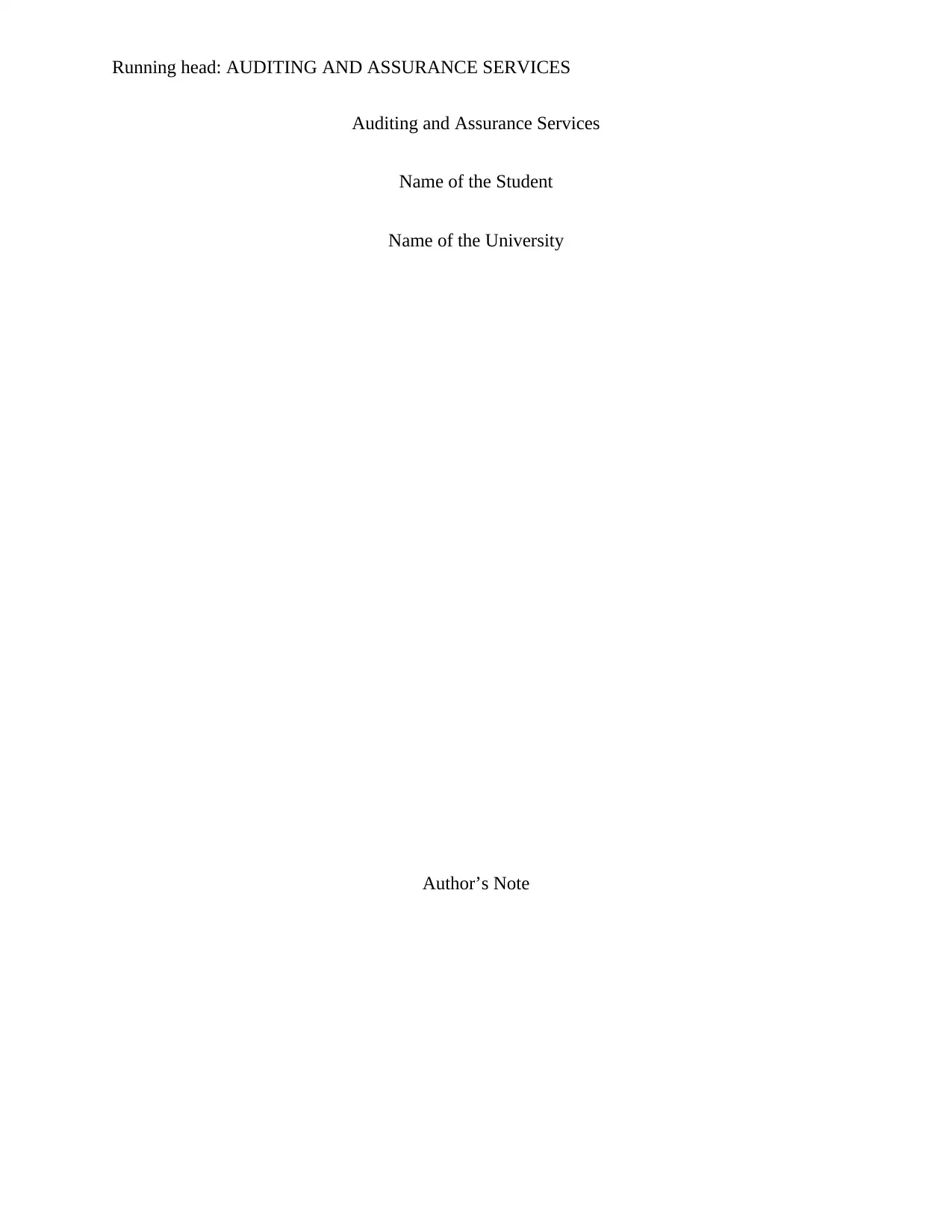
Running head: AUDITING AND ASSURANCE SERVICES
Auditing and Assurance Services
Name of the Student
Name of the University
Author’s Note
Auditing and Assurance Services
Name of the Student
Name of the University
Author’s Note
Secure Best Marks with AI Grader
Need help grading? Try our AI Grader for instant feedback on your assignments.
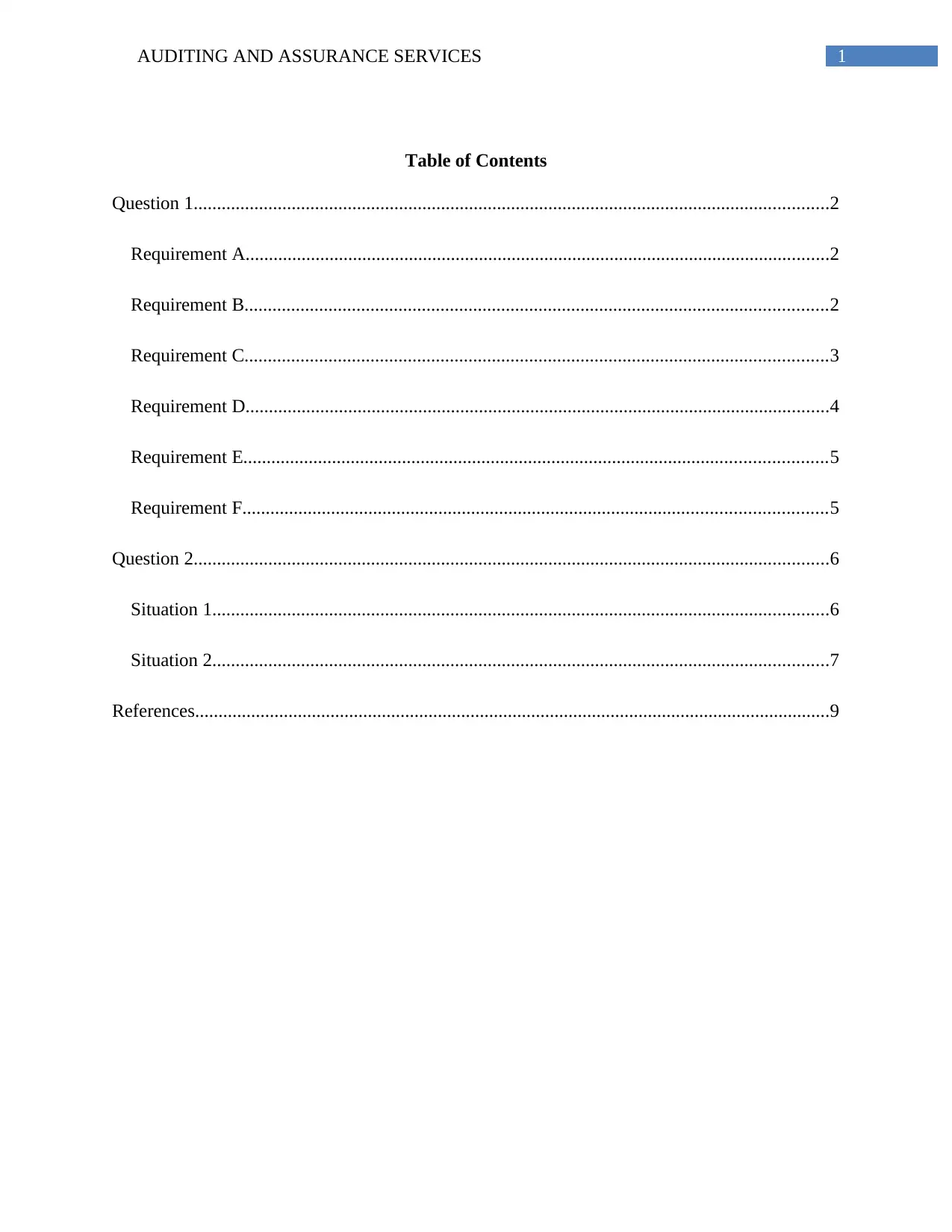
1AUDITING AND ASSURANCE SERVICES
Table of Contents
Question 1........................................................................................................................................2
Requirement A.............................................................................................................................2
Requirement B.............................................................................................................................2
Requirement C.............................................................................................................................3
Requirement D.............................................................................................................................4
Requirement E.............................................................................................................................5
Requirement F.............................................................................................................................5
Question 2........................................................................................................................................6
Situation 1....................................................................................................................................6
Situation 2....................................................................................................................................7
References........................................................................................................................................9
Table of Contents
Question 1........................................................................................................................................2
Requirement A.............................................................................................................................2
Requirement B.............................................................................................................................2
Requirement C.............................................................................................................................3
Requirement D.............................................................................................................................4
Requirement E.............................................................................................................................5
Requirement F.............................................................................................................................5
Question 2........................................................................................................................................6
Situation 1....................................................................................................................................6
Situation 2....................................................................................................................................7
References........................................................................................................................................9
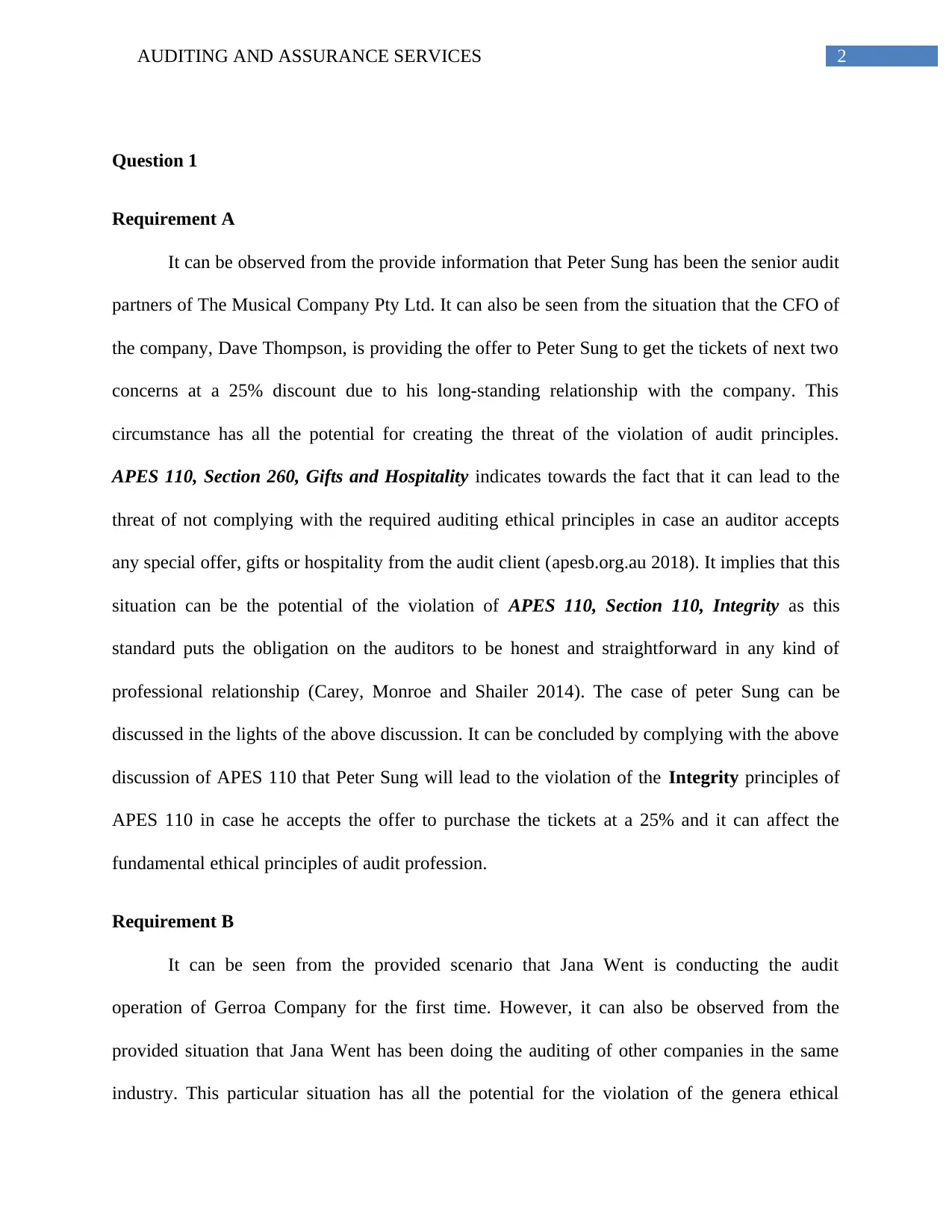
2AUDITING AND ASSURANCE SERVICES
Question 1
Requirement A
It can be observed from the provide information that Peter Sung has been the senior audit
partners of The Musical Company Pty Ltd. It can also be seen from the situation that the CFO of
the company, Dave Thompson, is providing the offer to Peter Sung to get the tickets of next two
concerns at a 25% discount due to his long-standing relationship with the company. This
circumstance has all the potential for creating the threat of the violation of audit principles.
APES 110, Section 260, Gifts and Hospitality indicates towards the fact that it can lead to the
threat of not complying with the required auditing ethical principles in case an auditor accepts
any special offer, gifts or hospitality from the audit client (apesb.org.au 2018). It implies that this
situation can be the potential of the violation of APES 110, Section 110, Integrity as this
standard puts the obligation on the auditors to be honest and straightforward in any kind of
professional relationship (Carey, Monroe and Shailer 2014). The case of peter Sung can be
discussed in the lights of the above discussion. It can be concluded by complying with the above
discussion of APES 110 that Peter Sung will lead to the violation of the Integrity principles of
APES 110 in case he accepts the offer to purchase the tickets at a 25% and it can affect the
fundamental ethical principles of audit profession.
Requirement B
It can be seen from the provided scenario that Jana Went is conducting the audit
operation of Gerroa Company for the first time. However, it can also be observed from the
provided situation that Jana Went has been doing the auditing of other companies in the same
industry. This particular situation has all the potential for the violation of the genera ethical
Question 1
Requirement A
It can be observed from the provide information that Peter Sung has been the senior audit
partners of The Musical Company Pty Ltd. It can also be seen from the situation that the CFO of
the company, Dave Thompson, is providing the offer to Peter Sung to get the tickets of next two
concerns at a 25% discount due to his long-standing relationship with the company. This
circumstance has all the potential for creating the threat of the violation of audit principles.
APES 110, Section 260, Gifts and Hospitality indicates towards the fact that it can lead to the
threat of not complying with the required auditing ethical principles in case an auditor accepts
any special offer, gifts or hospitality from the audit client (apesb.org.au 2018). It implies that this
situation can be the potential of the violation of APES 110, Section 110, Integrity as this
standard puts the obligation on the auditors to be honest and straightforward in any kind of
professional relationship (Carey, Monroe and Shailer 2014). The case of peter Sung can be
discussed in the lights of the above discussion. It can be concluded by complying with the above
discussion of APES 110 that Peter Sung will lead to the violation of the Integrity principles of
APES 110 in case he accepts the offer to purchase the tickets at a 25% and it can affect the
fundamental ethical principles of audit profession.
Requirement B
It can be seen from the provided scenario that Jana Went is conducting the audit
operation of Gerroa Company for the first time. However, it can also be observed from the
provided situation that Jana Went has been doing the auditing of other companies in the same
industry. This particular situation has all the potential for the violation of the genera ethical
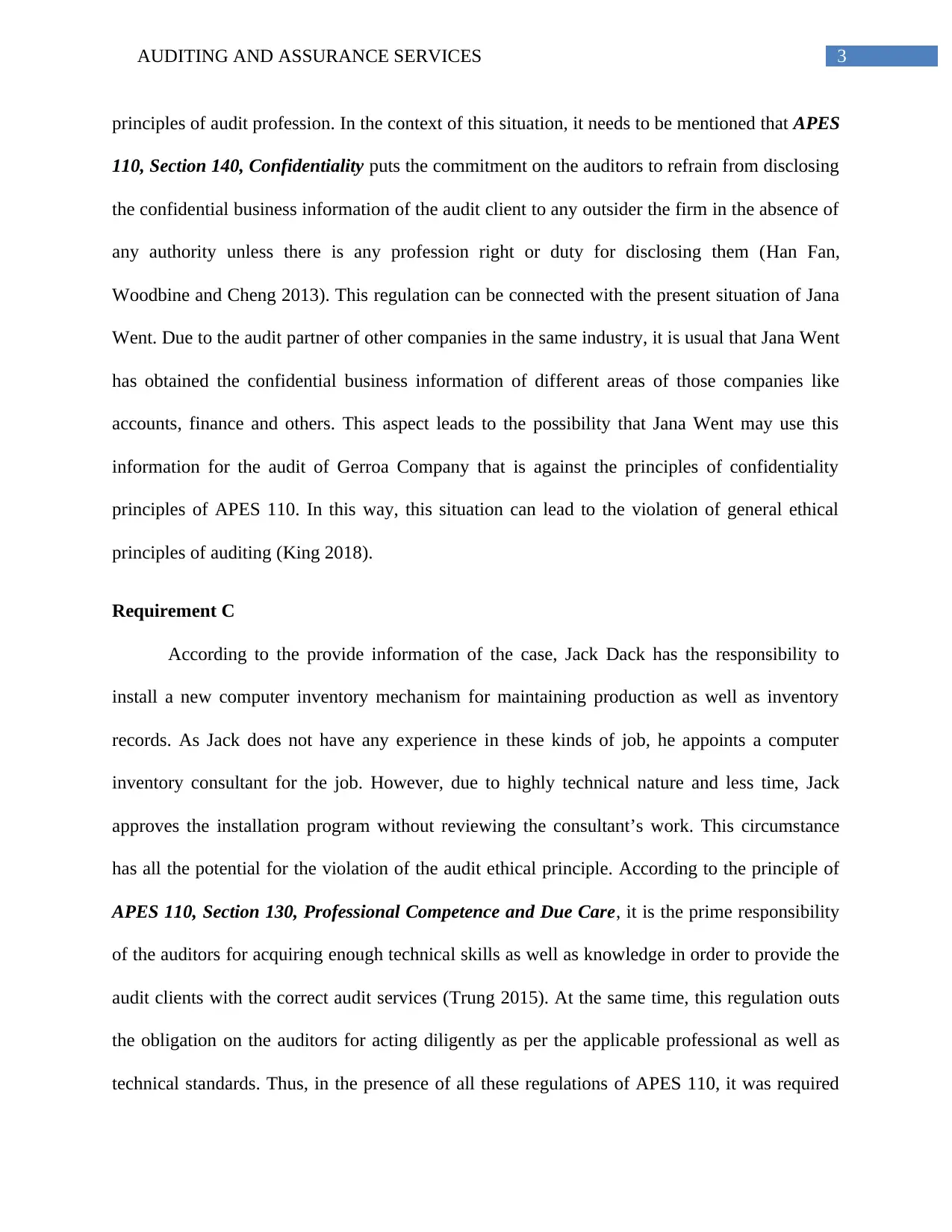
3AUDITING AND ASSURANCE SERVICES
principles of audit profession. In the context of this situation, it needs to be mentioned that APES
110, Section 140, Confidentiality puts the commitment on the auditors to refrain from disclosing
the confidential business information of the audit client to any outsider the firm in the absence of
any authority unless there is any profession right or duty for disclosing them (Han Fan,
Woodbine and Cheng 2013). This regulation can be connected with the present situation of Jana
Went. Due to the audit partner of other companies in the same industry, it is usual that Jana Went
has obtained the confidential business information of different areas of those companies like
accounts, finance and others. This aspect leads to the possibility that Jana Went may use this
information for the audit of Gerroa Company that is against the principles of confidentiality
principles of APES 110. In this way, this situation can lead to the violation of general ethical
principles of auditing (King 2018).
Requirement C
According to the provide information of the case, Jack Dack has the responsibility to
install a new computer inventory mechanism for maintaining production as well as inventory
records. As Jack does not have any experience in these kinds of job, he appoints a computer
inventory consultant for the job. However, due to highly technical nature and less time, Jack
approves the installation program without reviewing the consultant’s work. This circumstance
has all the potential for the violation of the audit ethical principle. According to the principle of
APES 110, Section 130, Professional Competence and Due Care, it is the prime responsibility
of the auditors for acquiring enough technical skills as well as knowledge in order to provide the
audit clients with the correct audit services (Trung 2015). At the same time, this regulation outs
the obligation on the auditors for acting diligently as per the applicable professional as well as
technical standards. Thus, in the presence of all these regulations of APES 110, it was required
principles of audit profession. In the context of this situation, it needs to be mentioned that APES
110, Section 140, Confidentiality puts the commitment on the auditors to refrain from disclosing
the confidential business information of the audit client to any outsider the firm in the absence of
any authority unless there is any profession right or duty for disclosing them (Han Fan,
Woodbine and Cheng 2013). This regulation can be connected with the present situation of Jana
Went. Due to the audit partner of other companies in the same industry, it is usual that Jana Went
has obtained the confidential business information of different areas of those companies like
accounts, finance and others. This aspect leads to the possibility that Jana Went may use this
information for the audit of Gerroa Company that is against the principles of confidentiality
principles of APES 110. In this way, this situation can lead to the violation of general ethical
principles of auditing (King 2018).
Requirement C
According to the provide information of the case, Jack Dack has the responsibility to
install a new computer inventory mechanism for maintaining production as well as inventory
records. As Jack does not have any experience in these kinds of job, he appoints a computer
inventory consultant for the job. However, due to highly technical nature and less time, Jack
approves the installation program without reviewing the consultant’s work. This circumstance
has all the potential for the violation of the audit ethical principle. According to the principle of
APES 110, Section 130, Professional Competence and Due Care, it is the prime responsibility
of the auditors for acquiring enough technical skills as well as knowledge in order to provide the
audit clients with the correct audit services (Trung 2015). At the same time, this regulation outs
the obligation on the auditors for acting diligently as per the applicable professional as well as
technical standards. Thus, in the presence of all these regulations of APES 110, it was required
Secure Best Marks with AI Grader
Need help grading? Try our AI Grader for instant feedback on your assignments.
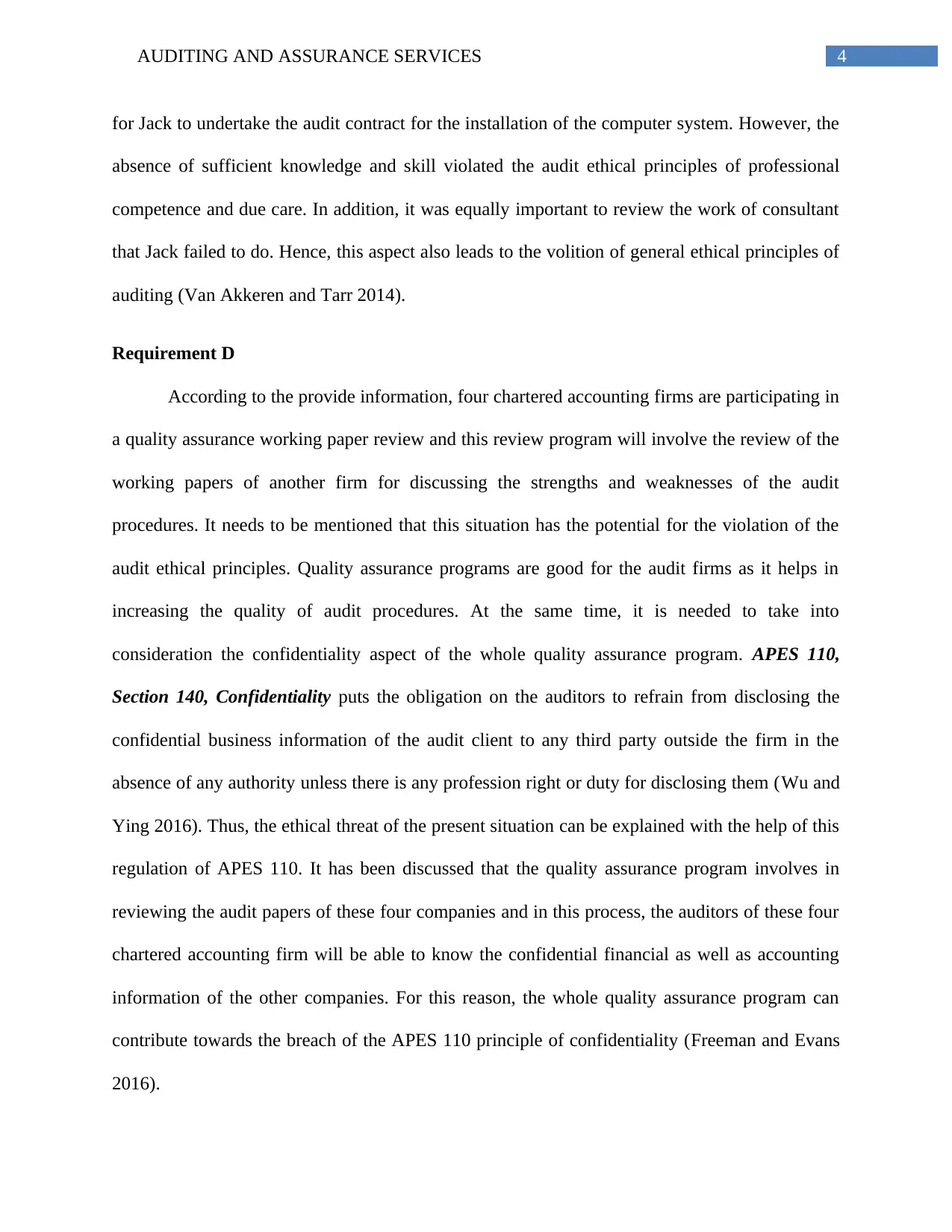
4AUDITING AND ASSURANCE SERVICES
for Jack to undertake the audit contract for the installation of the computer system. However, the
absence of sufficient knowledge and skill violated the audit ethical principles of professional
competence and due care. In addition, it was equally important to review the work of consultant
that Jack failed to do. Hence, this aspect also leads to the volition of general ethical principles of
auditing (Van Akkeren and Tarr 2014).
Requirement D
According to the provide information, four chartered accounting firms are participating in
a quality assurance working paper review and this review program will involve the review of the
working papers of another firm for discussing the strengths and weaknesses of the audit
procedures. It needs to be mentioned that this situation has the potential for the violation of the
audit ethical principles. Quality assurance programs are good for the audit firms as it helps in
increasing the quality of audit procedures. At the same time, it is needed to take into
consideration the confidentiality aspect of the whole quality assurance program. APES 110,
Section 140, Confidentiality puts the obligation on the auditors to refrain from disclosing the
confidential business information of the audit client to any third party outside the firm in the
absence of any authority unless there is any profession right or duty for disclosing them (Wu and
Ying 2016). Thus, the ethical threat of the present situation can be explained with the help of this
regulation of APES 110. It has been discussed that the quality assurance program involves in
reviewing the audit papers of these four companies and in this process, the auditors of these four
chartered accounting firm will be able to know the confidential financial as well as accounting
information of the other companies. For this reason, the whole quality assurance program can
contribute towards the breach of the APES 110 principle of confidentiality (Freeman and Evans
2016).
for Jack to undertake the audit contract for the installation of the computer system. However, the
absence of sufficient knowledge and skill violated the audit ethical principles of professional
competence and due care. In addition, it was equally important to review the work of consultant
that Jack failed to do. Hence, this aspect also leads to the volition of general ethical principles of
auditing (Van Akkeren and Tarr 2014).
Requirement D
According to the provide information, four chartered accounting firms are participating in
a quality assurance working paper review and this review program will involve the review of the
working papers of another firm for discussing the strengths and weaknesses of the audit
procedures. It needs to be mentioned that this situation has the potential for the violation of the
audit ethical principles. Quality assurance programs are good for the audit firms as it helps in
increasing the quality of audit procedures. At the same time, it is needed to take into
consideration the confidentiality aspect of the whole quality assurance program. APES 110,
Section 140, Confidentiality puts the obligation on the auditors to refrain from disclosing the
confidential business information of the audit client to any third party outside the firm in the
absence of any authority unless there is any profession right or duty for disclosing them (Wu and
Ying 2016). Thus, the ethical threat of the present situation can be explained with the help of this
regulation of APES 110. It has been discussed that the quality assurance program involves in
reviewing the audit papers of these four companies and in this process, the auditors of these four
chartered accounting firm will be able to know the confidential financial as well as accounting
information of the other companies. For this reason, the whole quality assurance program can
contribute towards the breach of the APES 110 principle of confidentiality (Freeman and Evans
2016).
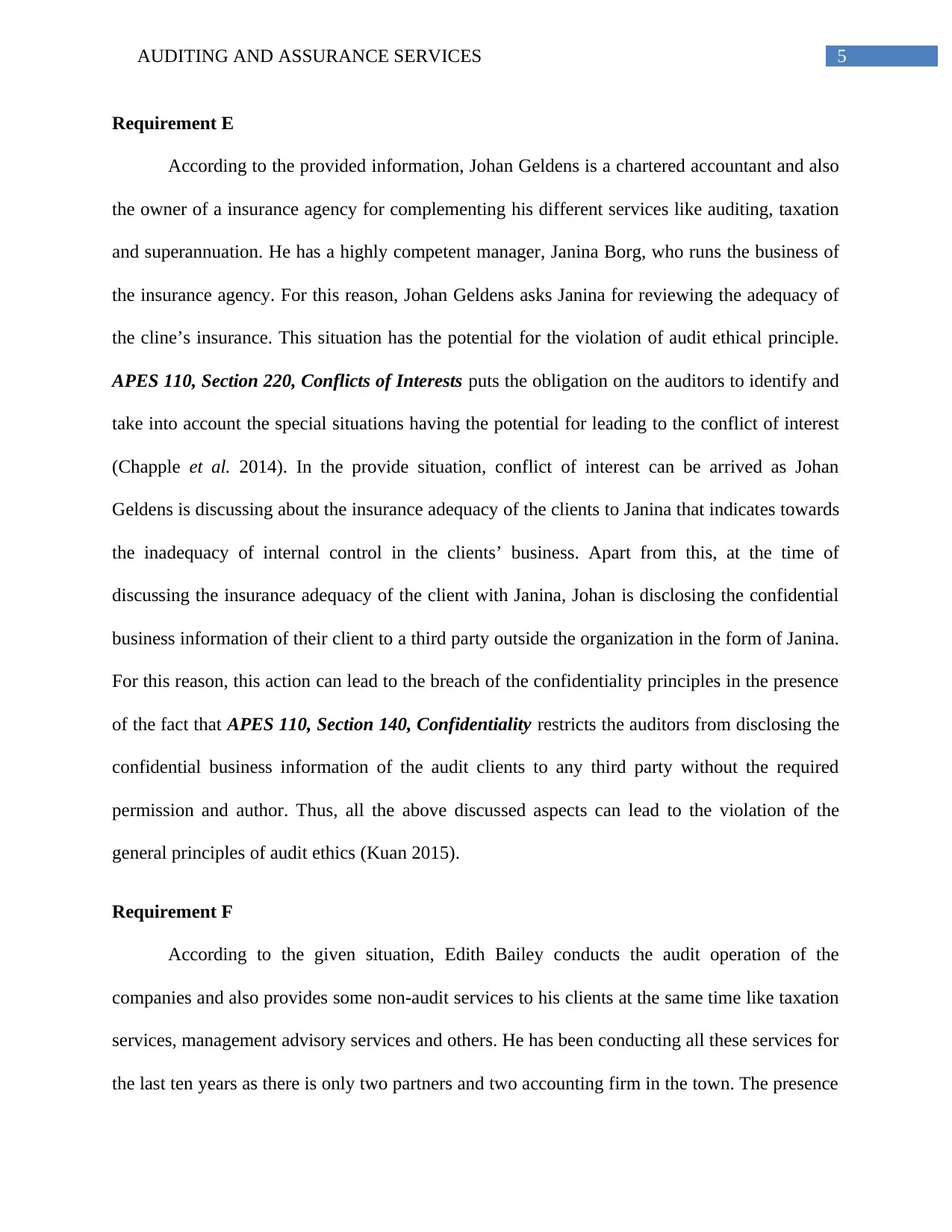
5AUDITING AND ASSURANCE SERVICES
Requirement E
According to the provided information, Johan Geldens is a chartered accountant and also
the owner of a insurance agency for complementing his different services like auditing, taxation
and superannuation. He has a highly competent manager, Janina Borg, who runs the business of
the insurance agency. For this reason, Johan Geldens asks Janina for reviewing the adequacy of
the cline’s insurance. This situation has the potential for the violation of audit ethical principle.
APES 110, Section 220, Conflicts of Interests puts the obligation on the auditors to identify and
take into account the special situations having the potential for leading to the conflict of interest
(Chapple et al. 2014). In the provide situation, conflict of interest can be arrived as Johan
Geldens is discussing about the insurance adequacy of the clients to Janina that indicates towards
the inadequacy of internal control in the clients’ business. Apart from this, at the time of
discussing the insurance adequacy of the client with Janina, Johan is disclosing the confidential
business information of their client to a third party outside the organization in the form of Janina.
For this reason, this action can lead to the breach of the confidentiality principles in the presence
of the fact that APES 110, Section 140, Confidentiality restricts the auditors from disclosing the
confidential business information of the audit clients to any third party without the required
permission and author. Thus, all the above discussed aspects can lead to the violation of the
general principles of audit ethics (Kuan 2015).
Requirement F
According to the given situation, Edith Bailey conducts the audit operation of the
companies and also provides some non-audit services to his clients at the same time like taxation
services, management advisory services and others. He has been conducting all these services for
the last ten years as there is only two partners and two accounting firm in the town. The presence
Requirement E
According to the provided information, Johan Geldens is a chartered accountant and also
the owner of a insurance agency for complementing his different services like auditing, taxation
and superannuation. He has a highly competent manager, Janina Borg, who runs the business of
the insurance agency. For this reason, Johan Geldens asks Janina for reviewing the adequacy of
the cline’s insurance. This situation has the potential for the violation of audit ethical principle.
APES 110, Section 220, Conflicts of Interests puts the obligation on the auditors to identify and
take into account the special situations having the potential for leading to the conflict of interest
(Chapple et al. 2014). In the provide situation, conflict of interest can be arrived as Johan
Geldens is discussing about the insurance adequacy of the clients to Janina that indicates towards
the inadequacy of internal control in the clients’ business. Apart from this, at the time of
discussing the insurance adequacy of the client with Janina, Johan is disclosing the confidential
business information of their client to a third party outside the organization in the form of Janina.
For this reason, this action can lead to the breach of the confidentiality principles in the presence
of the fact that APES 110, Section 140, Confidentiality restricts the auditors from disclosing the
confidential business information of the audit clients to any third party without the required
permission and author. Thus, all the above discussed aspects can lead to the violation of the
general principles of audit ethics (Kuan 2015).
Requirement F
According to the given situation, Edith Bailey conducts the audit operation of the
companies and also provides some non-audit services to his clients at the same time like taxation
services, management advisory services and others. He has been conducting all these services for
the last ten years as there is only two partners and two accounting firm in the town. The presence
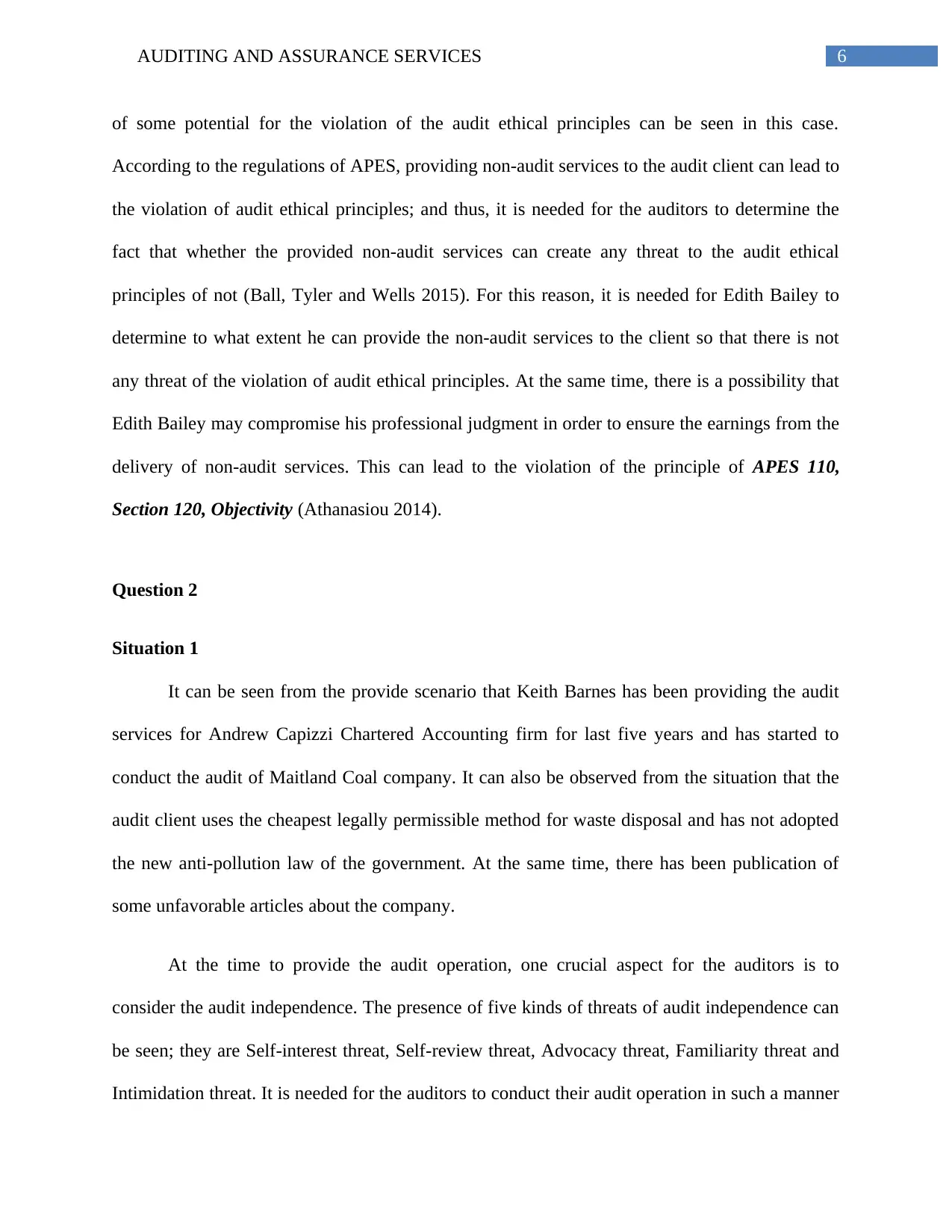
6AUDITING AND ASSURANCE SERVICES
of some potential for the violation of the audit ethical principles can be seen in this case.
According to the regulations of APES, providing non-audit services to the audit client can lead to
the violation of audit ethical principles; and thus, it is needed for the auditors to determine the
fact that whether the provided non-audit services can create any threat to the audit ethical
principles of not (Ball, Tyler and Wells 2015). For this reason, it is needed for Edith Bailey to
determine to what extent he can provide the non-audit services to the client so that there is not
any threat of the violation of audit ethical principles. At the same time, there is a possibility that
Edith Bailey may compromise his professional judgment in order to ensure the earnings from the
delivery of non-audit services. This can lead to the violation of the principle of APES 110,
Section 120, Objectivity (Athanasiou 2014).
Question 2
Situation 1
It can be seen from the provide scenario that Keith Barnes has been providing the audit
services for Andrew Capizzi Chartered Accounting firm for last five years and has started to
conduct the audit of Maitland Coal company. It can also be observed from the situation that the
audit client uses the cheapest legally permissible method for waste disposal and has not adopted
the new anti-pollution law of the government. At the same time, there has been publication of
some unfavorable articles about the company.
At the time to provide the audit operation, one crucial aspect for the auditors is to
consider the audit independence. The presence of five kinds of threats of audit independence can
be seen; they are Self-interest threat, Self-review threat, Advocacy threat, Familiarity threat and
Intimidation threat. It is needed for the auditors to conduct their audit operation in such a manner
of some potential for the violation of the audit ethical principles can be seen in this case.
According to the regulations of APES, providing non-audit services to the audit client can lead to
the violation of audit ethical principles; and thus, it is needed for the auditors to determine the
fact that whether the provided non-audit services can create any threat to the audit ethical
principles of not (Ball, Tyler and Wells 2015). For this reason, it is needed for Edith Bailey to
determine to what extent he can provide the non-audit services to the client so that there is not
any threat of the violation of audit ethical principles. At the same time, there is a possibility that
Edith Bailey may compromise his professional judgment in order to ensure the earnings from the
delivery of non-audit services. This can lead to the violation of the principle of APES 110,
Section 120, Objectivity (Athanasiou 2014).
Question 2
Situation 1
It can be seen from the provide scenario that Keith Barnes has been providing the audit
services for Andrew Capizzi Chartered Accounting firm for last five years and has started to
conduct the audit of Maitland Coal company. It can also be observed from the situation that the
audit client uses the cheapest legally permissible method for waste disposal and has not adopted
the new anti-pollution law of the government. At the same time, there has been publication of
some unfavorable articles about the company.
At the time to provide the audit operation, one crucial aspect for the auditors is to
consider the audit independence. The presence of five kinds of threats of audit independence can
be seen; they are Self-interest threat, Self-review threat, Advocacy threat, Familiarity threat and
Intimidation threat. It is needed for the auditors to conduct their audit operation in such a manner
Paraphrase This Document
Need a fresh take? Get an instant paraphrase of this document with our AI Paraphraser
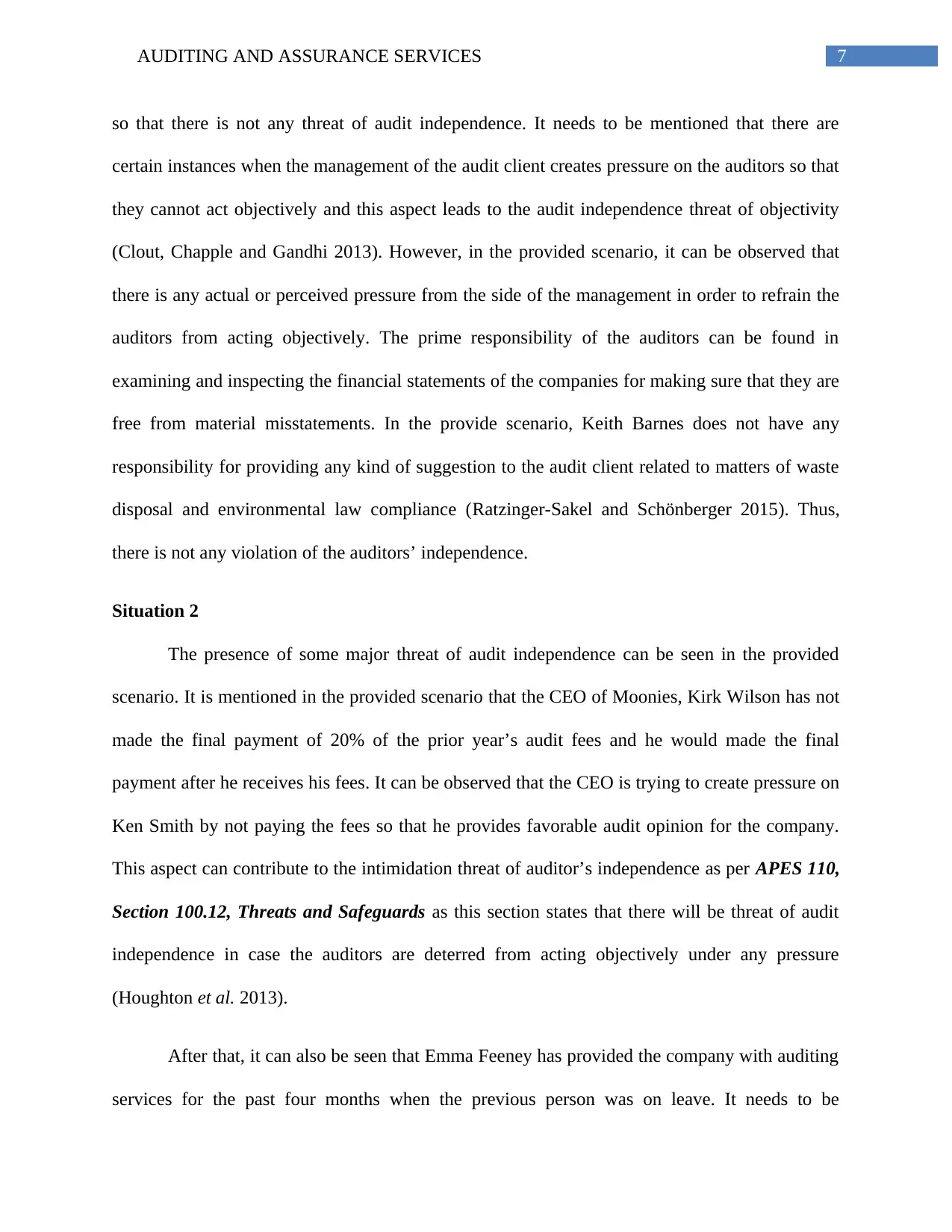
7AUDITING AND ASSURANCE SERVICES
so that there is not any threat of audit independence. It needs to be mentioned that there are
certain instances when the management of the audit client creates pressure on the auditors so that
they cannot act objectively and this aspect leads to the audit independence threat of objectivity
(Clout, Chapple and Gandhi 2013). However, in the provided scenario, it can be observed that
there is any actual or perceived pressure from the side of the management in order to refrain the
auditors from acting objectively. The prime responsibility of the auditors can be found in
examining and inspecting the financial statements of the companies for making sure that they are
free from material misstatements. In the provide scenario, Keith Barnes does not have any
responsibility for providing any kind of suggestion to the audit client related to matters of waste
disposal and environmental law compliance (Ratzinger-Sakel and Schönberger 2015). Thus,
there is not any violation of the auditors’ independence.
Situation 2
The presence of some major threat of audit independence can be seen in the provided
scenario. It is mentioned in the provided scenario that the CEO of Moonies, Kirk Wilson has not
made the final payment of 20% of the prior year’s audit fees and he would made the final
payment after he receives his fees. It can be observed that the CEO is trying to create pressure on
Ken Smith by not paying the fees so that he provides favorable audit opinion for the company.
This aspect can contribute to the intimidation threat of auditor’s independence as per APES 110,
Section 100.12, Threats and Safeguards as this section states that there will be threat of audit
independence in case the auditors are deterred from acting objectively under any pressure
(Houghton et al. 2013).
After that, it can also be seen that Emma Feeney has provided the company with auditing
services for the past four months when the previous person was on leave. It needs to be
so that there is not any threat of audit independence. It needs to be mentioned that there are
certain instances when the management of the audit client creates pressure on the auditors so that
they cannot act objectively and this aspect leads to the audit independence threat of objectivity
(Clout, Chapple and Gandhi 2013). However, in the provided scenario, it can be observed that
there is any actual or perceived pressure from the side of the management in order to refrain the
auditors from acting objectively. The prime responsibility of the auditors can be found in
examining and inspecting the financial statements of the companies for making sure that they are
free from material misstatements. In the provide scenario, Keith Barnes does not have any
responsibility for providing any kind of suggestion to the audit client related to matters of waste
disposal and environmental law compliance (Ratzinger-Sakel and Schönberger 2015). Thus,
there is not any violation of the auditors’ independence.
Situation 2
The presence of some major threat of audit independence can be seen in the provided
scenario. It is mentioned in the provided scenario that the CEO of Moonies, Kirk Wilson has not
made the final payment of 20% of the prior year’s audit fees and he would made the final
payment after he receives his fees. It can be observed that the CEO is trying to create pressure on
Ken Smith by not paying the fees so that he provides favorable audit opinion for the company.
This aspect can contribute to the intimidation threat of auditor’s independence as per APES 110,
Section 100.12, Threats and Safeguards as this section states that there will be threat of audit
independence in case the auditors are deterred from acting objectively under any pressure
(Houghton et al. 2013).
After that, it can also be seen that Emma Feeney has provided the company with auditing
services for the past four months when the previous person was on leave. It needs to be
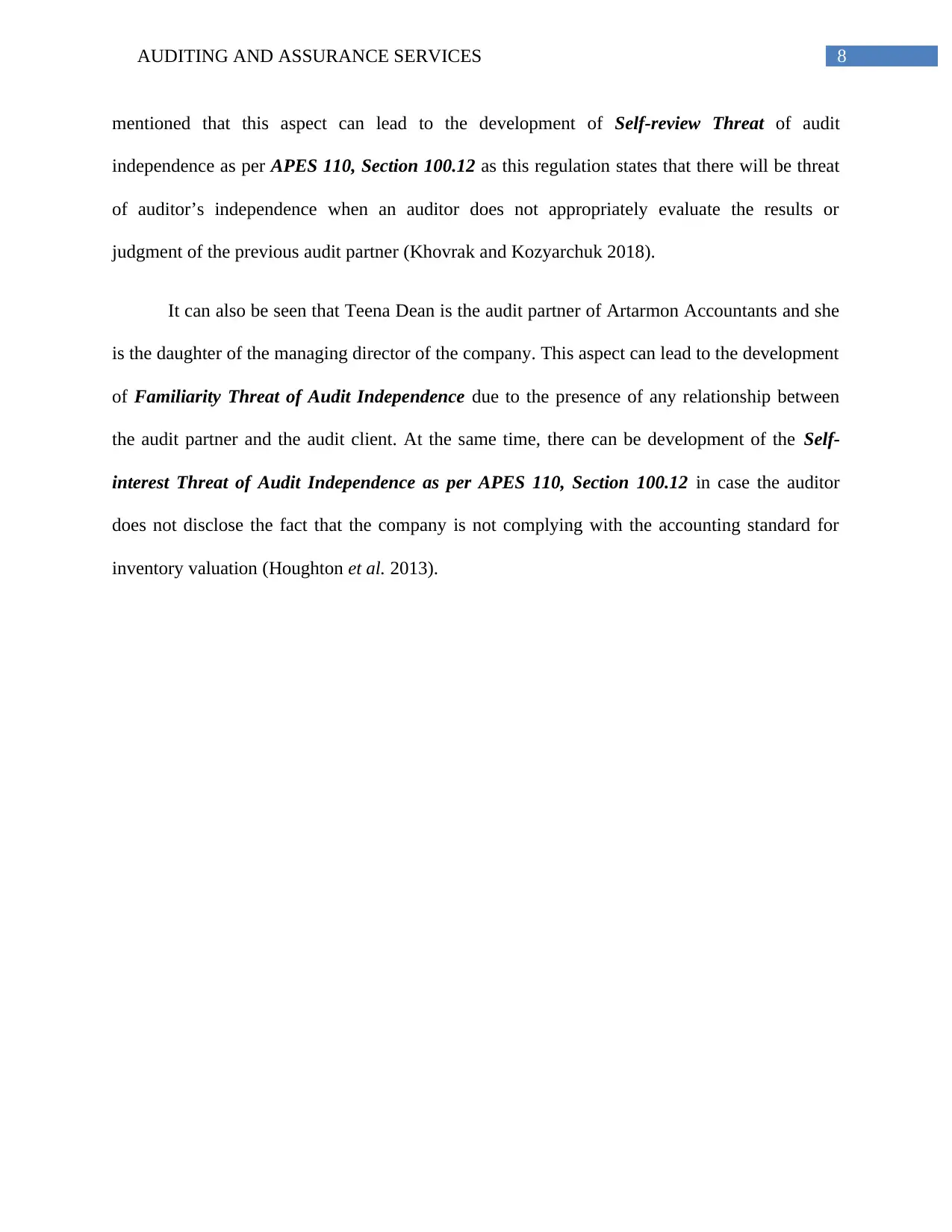
8AUDITING AND ASSURANCE SERVICES
mentioned that this aspect can lead to the development of Self-review Threat of audit
independence as per APES 110, Section 100.12 as this regulation states that there will be threat
of auditor’s independence when an auditor does not appropriately evaluate the results or
judgment of the previous audit partner (Khovrak and Kozyarchuk 2018).
It can also be seen that Teena Dean is the audit partner of Artarmon Accountants and she
is the daughter of the managing director of the company. This aspect can lead to the development
of Familiarity Threat of Audit Independence due to the presence of any relationship between
the audit partner and the audit client. At the same time, there can be development of the Self-
interest Threat of Audit Independence as per APES 110, Section 100.12 in case the auditor
does not disclose the fact that the company is not complying with the accounting standard for
inventory valuation (Houghton et al. 2013).
mentioned that this aspect can lead to the development of Self-review Threat of audit
independence as per APES 110, Section 100.12 as this regulation states that there will be threat
of auditor’s independence when an auditor does not appropriately evaluate the results or
judgment of the previous audit partner (Khovrak and Kozyarchuk 2018).
It can also be seen that Teena Dean is the audit partner of Artarmon Accountants and she
is the daughter of the managing director of the company. This aspect can lead to the development
of Familiarity Threat of Audit Independence due to the presence of any relationship between
the audit partner and the audit client. At the same time, there can be development of the Self-
interest Threat of Audit Independence as per APES 110, Section 100.12 in case the auditor
does not disclose the fact that the company is not complying with the accounting standard for
inventory valuation (Houghton et al. 2013).
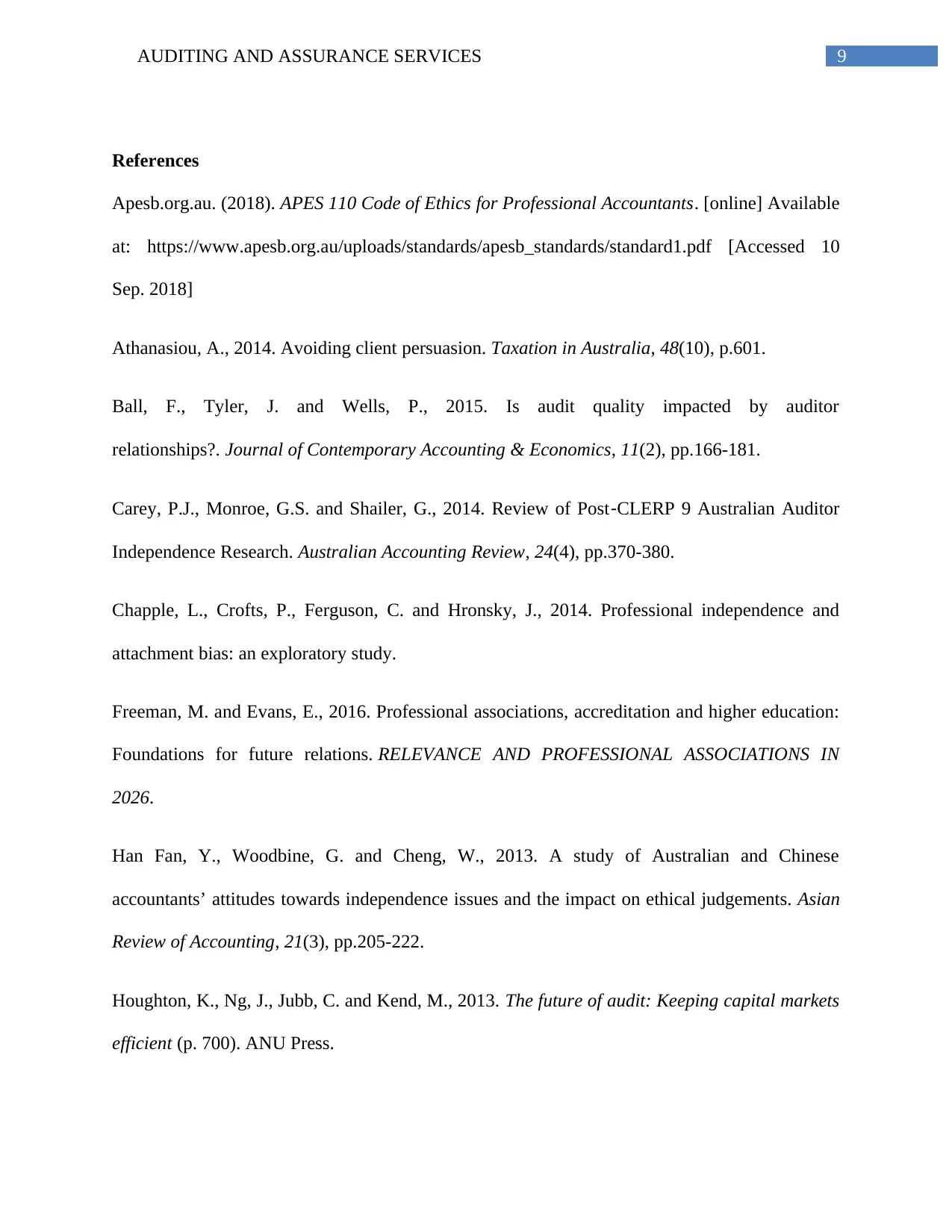
9AUDITING AND ASSURANCE SERVICES
References
Apesb.org.au. (2018). APES 110 Code of Ethics for Professional Accountants. [online] Available
at: https://www.apesb.org.au/uploads/standards/apesb_standards/standard1.pdf [Accessed 10
Sep. 2018]
Athanasiou, A., 2014. Avoiding client persuasion. Taxation in Australia, 48(10), p.601.
Ball, F., Tyler, J. and Wells, P., 2015. Is audit quality impacted by auditor
relationships?. Journal of Contemporary Accounting & Economics, 11(2), pp.166-181.
Carey, P.J., Monroe, G.S. and Shailer, G., 2014. Review of Post‐CLERP 9 Australian Auditor
Independence Research. Australian Accounting Review, 24(4), pp.370-380.
Chapple, L., Crofts, P., Ferguson, C. and Hronsky, J., 2014. Professional independence and
attachment bias: an exploratory study.
Freeman, M. and Evans, E., 2016. Professional associations, accreditation and higher education:
Foundations for future relations. RELEVANCE AND PROFESSIONAL ASSOCIATIONS IN
2026.
Han Fan, Y., Woodbine, G. and Cheng, W., 2013. A study of Australian and Chinese
accountants’ attitudes towards independence issues and the impact on ethical judgements. Asian
Review of Accounting, 21(3), pp.205-222.
Houghton, K., Ng, J., Jubb, C. and Kend, M., 2013. The future of audit: Keeping capital markets
efficient (p. 700). ANU Press.
References
Apesb.org.au. (2018). APES 110 Code of Ethics for Professional Accountants. [online] Available
at: https://www.apesb.org.au/uploads/standards/apesb_standards/standard1.pdf [Accessed 10
Sep. 2018]
Athanasiou, A., 2014. Avoiding client persuasion. Taxation in Australia, 48(10), p.601.
Ball, F., Tyler, J. and Wells, P., 2015. Is audit quality impacted by auditor
relationships?. Journal of Contemporary Accounting & Economics, 11(2), pp.166-181.
Carey, P.J., Monroe, G.S. and Shailer, G., 2014. Review of Post‐CLERP 9 Australian Auditor
Independence Research. Australian Accounting Review, 24(4), pp.370-380.
Chapple, L., Crofts, P., Ferguson, C. and Hronsky, J., 2014. Professional independence and
attachment bias: an exploratory study.
Freeman, M. and Evans, E., 2016. Professional associations, accreditation and higher education:
Foundations for future relations. RELEVANCE AND PROFESSIONAL ASSOCIATIONS IN
2026.
Han Fan, Y., Woodbine, G. and Cheng, W., 2013. A study of Australian and Chinese
accountants’ attitudes towards independence issues and the impact on ethical judgements. Asian
Review of Accounting, 21(3), pp.205-222.
Houghton, K., Ng, J., Jubb, C. and Kend, M., 2013. The future of audit: Keeping capital markets
efficient (p. 700). ANU Press.
Secure Best Marks with AI Grader
Need help grading? Try our AI Grader for instant feedback on your assignments.
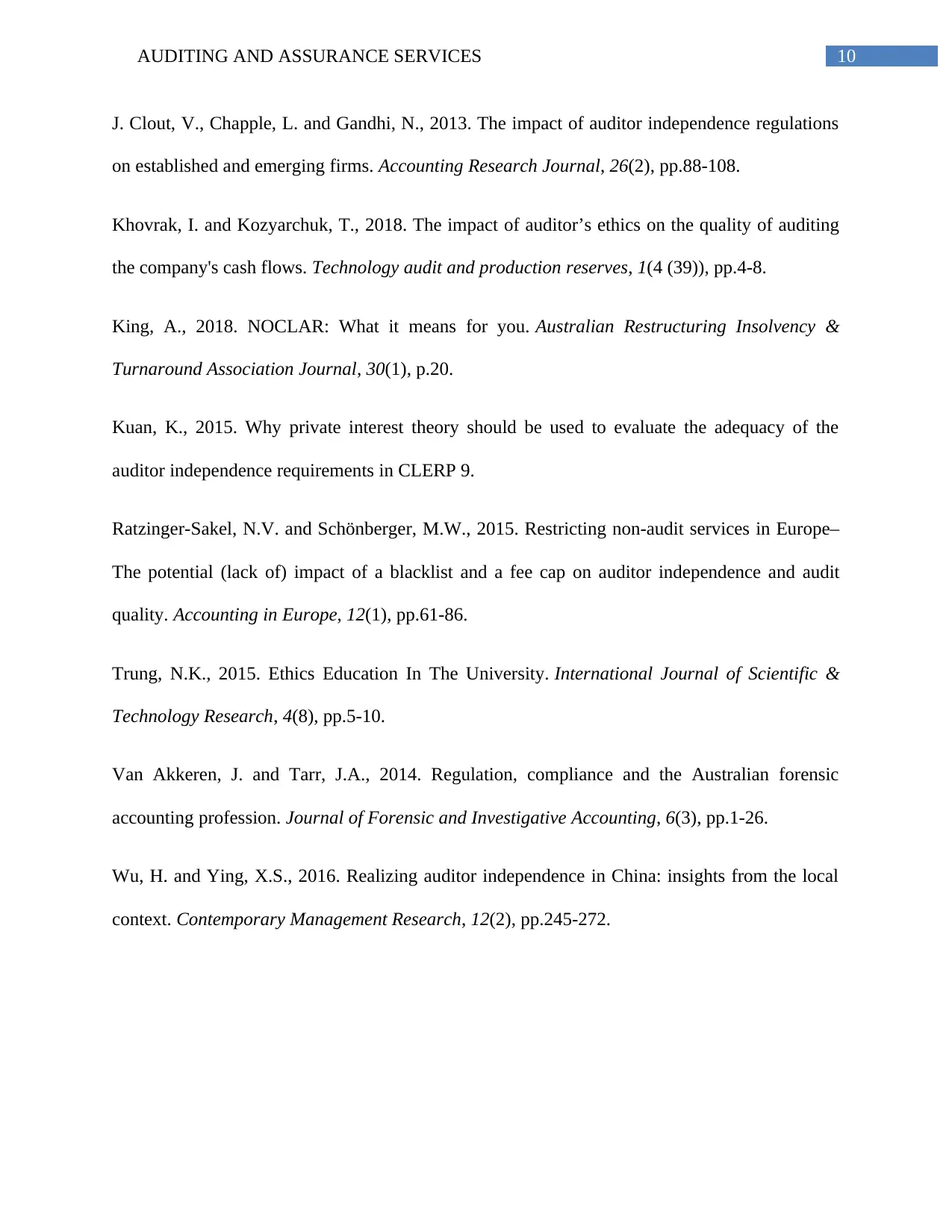
10AUDITING AND ASSURANCE SERVICES
J. Clout, V., Chapple, L. and Gandhi, N., 2013. The impact of auditor independence regulations
on established and emerging firms. Accounting Research Journal, 26(2), pp.88-108.
Khovrak, I. and Kozyarchuk, T., 2018. The impact of auditor’s ethics on the quality of auditing
the company's cash flows. Technology audit and production reserves, 1(4 (39)), pp.4-8.
King, A., 2018. NOCLAR: What it means for you. Australian Restructuring Insolvency &
Turnaround Association Journal, 30(1), p.20.
Kuan, K., 2015. Why private interest theory should be used to evaluate the adequacy of the
auditor independence requirements in CLERP 9.
Ratzinger-Sakel, N.V. and Schönberger, M.W., 2015. Restricting non-audit services in Europe–
The potential (lack of) impact of a blacklist and a fee cap on auditor independence and audit
quality. Accounting in Europe, 12(1), pp.61-86.
Trung, N.K., 2015. Ethics Education In The University. International Journal of Scientific &
Technology Research, 4(8), pp.5-10.
Van Akkeren, J. and Tarr, J.A., 2014. Regulation, compliance and the Australian forensic
accounting profession. Journal of Forensic and Investigative Accounting, 6(3), pp.1-26.
Wu, H. and Ying, X.S., 2016. Realizing auditor independence in China: insights from the local
context. Contemporary Management Research, 12(2), pp.245-272.
J. Clout, V., Chapple, L. and Gandhi, N., 2013. The impact of auditor independence regulations
on established and emerging firms. Accounting Research Journal, 26(2), pp.88-108.
Khovrak, I. and Kozyarchuk, T., 2018. The impact of auditor’s ethics on the quality of auditing
the company's cash flows. Technology audit and production reserves, 1(4 (39)), pp.4-8.
King, A., 2018. NOCLAR: What it means for you. Australian Restructuring Insolvency &
Turnaround Association Journal, 30(1), p.20.
Kuan, K., 2015. Why private interest theory should be used to evaluate the adequacy of the
auditor independence requirements in CLERP 9.
Ratzinger-Sakel, N.V. and Schönberger, M.W., 2015. Restricting non-audit services in Europe–
The potential (lack of) impact of a blacklist and a fee cap on auditor independence and audit
quality. Accounting in Europe, 12(1), pp.61-86.
Trung, N.K., 2015. Ethics Education In The University. International Journal of Scientific &
Technology Research, 4(8), pp.5-10.
Van Akkeren, J. and Tarr, J.A., 2014. Regulation, compliance and the Australian forensic
accounting profession. Journal of Forensic and Investigative Accounting, 6(3), pp.1-26.
Wu, H. and Ying, X.S., 2016. Realizing auditor independence in China: insights from the local
context. Contemporary Management Research, 12(2), pp.245-272.
1 out of 11
Related Documents
Your All-in-One AI-Powered Toolkit for Academic Success.
+13062052269
info@desklib.com
Available 24*7 on WhatsApp / Email
![[object Object]](/_next/static/media/star-bottom.7253800d.svg)
Unlock your academic potential
© 2024 | Zucol Services PVT LTD | All rights reserved.




